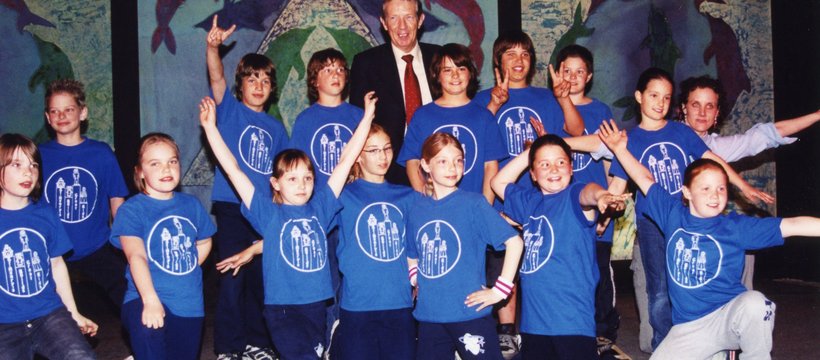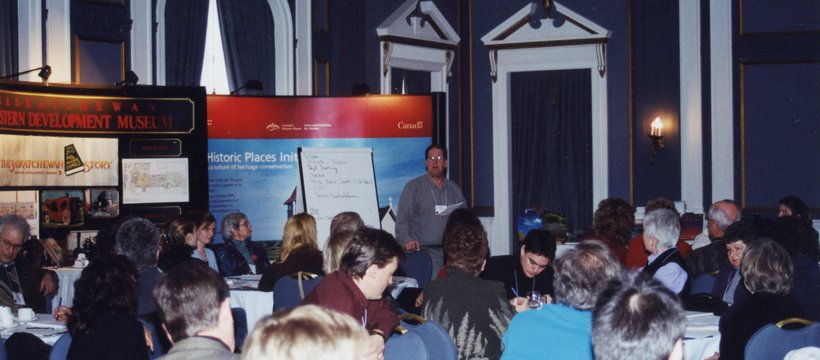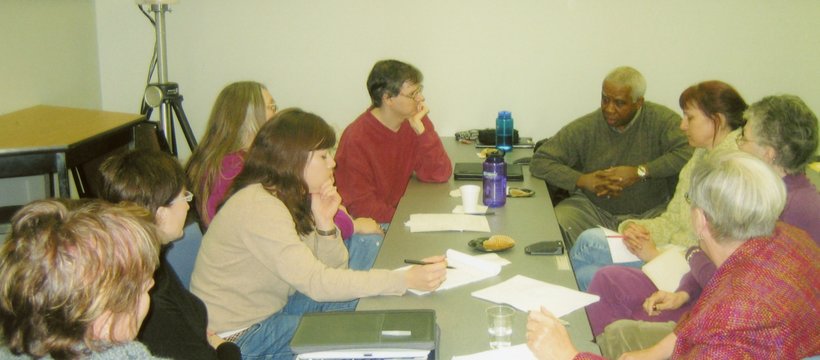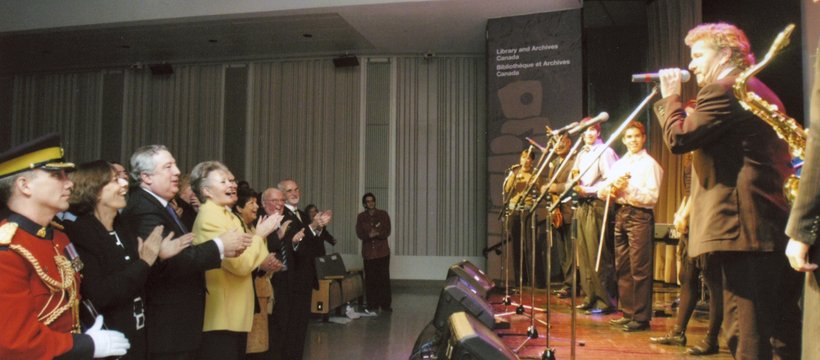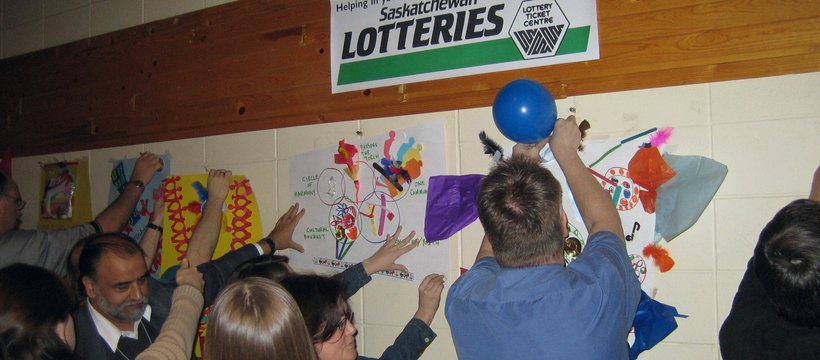Celebration and Review: 2005 - 2007
The 2005 Centennial Celebrations were a joyful distraction from the financial struggles of the time. SaskCulture supported the government initiatives by facilitating the adjudication of the Celebrating Community Centennial Grant Program and the Centennial Student Employment Program. Over 2004/05, the Cultural Component of the provincial government’s Centennial Student Employment Fund received $84,000 and funded 29 cultural intern positions for Saskatchewan youth.
SaskCulture also worked with Events…Saskatchewan! to bring together several partners from different levels of government to enable a Centennial event held in the National Archives in Ottawa. The event, held November 16-18, 2005, was hosted by the former Head Archivist, Ian Wilson, a former Saskatchewan resident. The Saskatchewan cultural showcase featured the talents of musicians, visual artists, and theatre performances, for Saskatchewan ex-patriots and others in Ottawa.
SaskCulture had developed its own Centennial brand for use during the 2005 Saskatchewan Centennial, and worked with the heritage community and staff from the Saskatchewan Ministry of Learning to
develop a special heritage learning initiative, designed to increase awareness of heritage among teachers and Grade 10-12 students in the province. The Saskatchewan Student Heritage Project, which received funding support from the federal and provincial government, was established in both official languages and launched in the province in fall 2005. The heritage community also embarked on a communications strategy that included the publication of a monthly Heritage E-Advocate publication, aimed at building unity among the different areas of heritage. This promotion was timed nicely with the implementation of the Family Day holiday in 2007, which SaskCulture linked to National Heritage Day celebrations in the same week.
SaskCulture used the momentum during this period to build new promotions. It began purchasing Saskatchewan-made cultural programs to use as donations and gifts as a means to promote Saskatchewan’s cultural industries during the Centennial and beyond. It also completed profiles of each of the eligible funded organizations and published these backgrounders as PCO Profiles in 2007.
SaskCulture spent a good portion of 2005 addressing a reduction in the amount of lottery proceeds available in the Saskatchewan Lotteries Trust Fund for Sport, Culture and Recreation. At the end of the Trust’s fiscal year, the revenues to the Trust Fund were substantially lower than had been projected. Faced with possible reductions, as high as 25%, the tri-global partnership, along with their members and community supporters, made a request to the provincial government to open up the Lottery Agreement and decrease the licence fee. In June 2005, the government of Saskatchewan amended the existing lottery licence agreement to reduce the fee from 9.5% to 5 % for the current year. This amendment maintained the funding levels comparable to the previous year – and resulted in stabilizing funding for the community. And, fortunately by 2007, the government had taken back the responsibility of funding the grant component of the Saskatchewan Heritage Foundation.
During this time, SaskCulture provided tools and resources to help the community adjust to the lack of funding increases, including providing a human resource tool, entitled Navigating Your Options, as well as coordinating and updated Compensation and Benefits Study in 2005, holding Peer Learning Group meetings, as well as moving the Member Handbook resources to the SaskCulture web site. SaskCulture went through a human resources review itself during this time, to help determine and accommodate future staffing needs.
In 2006, SaskCulture started the year by bringing together its members and community partners for a Funding Review Summit. The event, which brought together over 100 people from the cultural community, was designed to help build plans to ensure funding from the Culture Section of the Saskatchewan Lotteries Trust Fund for Sport, Culture and Recreation was supporting cultural activity that met the needs of Saskatchewan people. Later in 2007, the SaskCulture Funding Review Team met and interviewed all 31 provincial cultural organizations as part of its review process. These interviews compiled the data required for the Board to make recommendations. These recommendations were presented as an Implementation Strategy as part of the 2007 Annual Gathering held in Regina.
On March 13, 2006, SaskCulture, along with its partners Sask Sport, Saskatchewan Parks and Recreation Association and Minister Glenn Hagel, on behalf of the Government of Saskatchewan, signed a new three-year Lottery Licence Agreement. The provincial government agreed to reduce the licence fee for the 2006-2009 agreement to 3%, to provide even more stability for sport, culture and recreation in Saskatchewan. SaskCulture also launched a new data collection tool to help it report on new indicators established in the new lottery agreement.
SaskCulture continued work with its partners on the Aboriginal Action Plan. After consulting with several focus groups, SaskCulture formed a First Nations and Métis Advisory Circle. The Circle, officially formed in 2005, was established as a dialogue mechanism for the community and to advise SaskCulture on changes needed to increase participation of First Nations and Métis peoples in cultural activity in the province. A new First Nations and Métis Coordinator position was created in 2007 to replace the Aboriginal Coordinator position in order to carry on the work in this area. And, besides coordinating the Circle, the Coordinator took on the launch of a brand new funding program, called the Aboriginal Cultural Leadership Grant (AACL), designed to support First Nations and Métis cultural leaders in providing cultural opportunities at the local level. The grant was based on the work the Saskatchewan Arts Board had initiated on behalf of the government for the Centennial year celebrations. SaskCulture also held an Aboriginal Cultural Education Session (ACES) at Flinthorn Tipi Camp at Carry the Kettle First Nations as an opportunity for non-Aboriginal cultural leaders to learn key aspects of First Nation’s culture in this area.
The Multicultural Community of Interest Committee, led by MCoS as the secretariat, hosted two multicultural forums, one in November 2006 in Regina and the other in February 2007 in Saskatoon. Over 100 delegates attended each event and offered useful insight into the future of multiculturalism in Saskatchewan.
During this time period, a review, called Building Better Communities, was initiated of the existing delivery model for sport, culture and recreation. SaskCulture participated to help ensure that a new model would embrace cultural activity more effectively. In January 2006, the Building Better Communities Report was released to the community, outlining the recommended action of merging the 23 recreation regions and nine sport councils into nine districts for sport, culture and recreation. The partners worked with the funding model, and by 2007, they had established the Community Development Fund, which would support the Districts for Sport, Culture and Recreation and the Northern Community Schools Program – Sask Sport 40%, SaskCulture 30% and SPRA 30% - and is still in place today.
The Creative Cities Network and municipal cultural planning were gaining momentum during this period. In 2007, SaskCulture funded the City of Saskatoon Creative Cities Project, Building Cultural Bridges, to support a cultural mapping initiative. In October the same year, SaskCulture signed a contract with an external coordinator to help oversee a Municipal Cultural Engagement Strategy. Initial work, earlier in the year was done to interest the communities of Yorkton, Swift Current, Lumsden and Muskoday First Nation into becoming pilot studies for the strategy. To help stimulate more interest, SaskCulture brought Dr. Greg Baeker to speak on the benefits of municipal cultural planning at the 2008 Saskatchewan Urban Municipalities Association Conference held in Regina. In the end, Yorkton was the only community to complete a Cultural Plan which was launched in 2009. However, discussion began on the formation of a new grant program to support municipalities in cultural planning.
Late in 2007, the government announced the results of Music Industry Review Final Report, as well as granting an additional $4.5 million to the Saskatchewan Arts Board to provide new support for cultural industries, including a revolving investment fund, as well as support to delivery on recommendations made in the Status of the Artist legislation review. Also as part of this initiative, five of the eligible cultural organizations, previously supported through the Trust, began receiving their funding from the General Revenue Fund (GRF) via the Saskatchewan Arts Board. The five organizations included the Saskatchewan Sound Recording Industry Association (SaskMusic), Saskatchewan Motion Picture Industry Association, Saskatchewan Publishers Group, Saskatchewan Craft Council and CARFAC Saskatchewan. This change freed up additional Culture Section dollars for other cultural development efforts.


